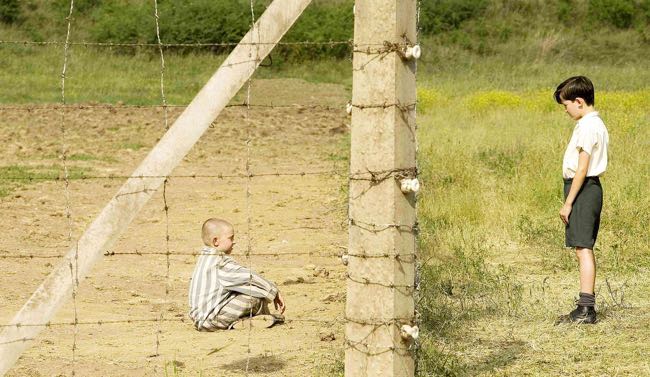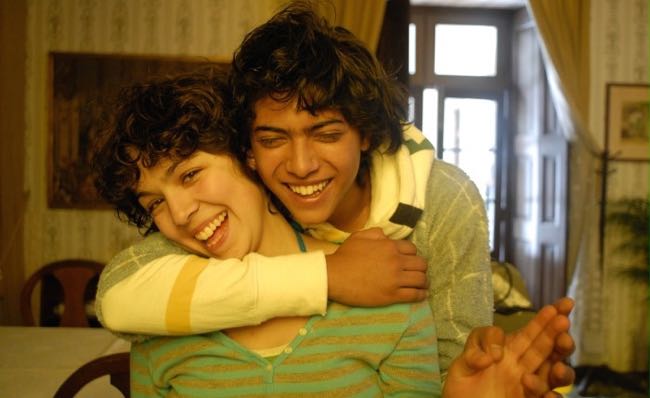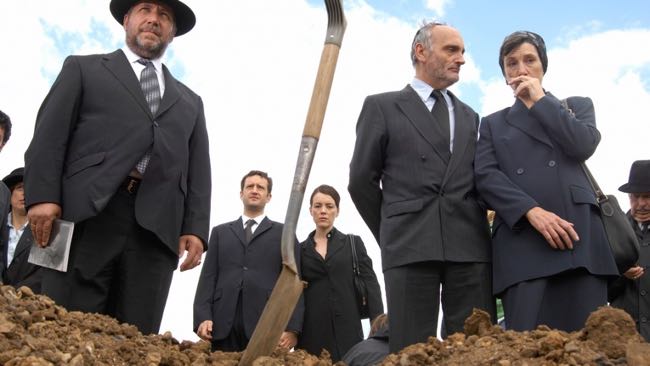LONDON – The home life of the Nazi commandant of a World War Two concentration camp appears bizarrely serene in Mark Herman’s grave and powerful drama “The Boy In the Striped Pajamas,” but the innocent are bound to suffer when humanity is abandoned.
A fine adaptation of John Boyne’s novel, which was aimed at children, the film is more adult in its approach although its stern message remains important for youngsters. Set for a Miramax release in the United States on Nov. 7, it’s a tough-minded lesson for those who would perpetrate genocide and it should register strongly with a long afterlife on DVD.
Boyne’s tale is starkly cautionary and writer/director Herman handles a difficult topic with great sensitivity, drawing splendid performances from his young actors with David Thewlis and Vera Farmiga and the other grownups reliably efficient.
It’s the story of the unlikely friendship between two little boys. Bruno (Asa Butterfield) is the sheltered and entirely self-absorbed son of a Nazi officer (Thewlis) living in innocent luxury. Shmuel (Jack Scanlon) is a Jewish boy living behind barbed wire in the direst state of hunger and fear.
Bruno and his family – impressionable sister Gretel (Amber Beattie) and their gentle mother (Farmiga) – have just moved from Berlin to the countryside where strict but loving papa has taken up his new command running a prison camp.
The naïve and scatterbrained Bruno sort of knows that his father is a Nazi officer but he has no clue what it means. At the new house, a shuffling and obedient servant brought in from the camp, Pavel (David Hayman), cowers before brutal adjutant Lt. Kotler (Rupert Friend) but Bruno barely notices while Gretel develops a crush on the explosive young Nazi.
Bruno is deluded about what life is like at his father’s camp because faked videos that show its inhabitants happy and well-fed have been screened at home for visiting dignitaries and Red Cross inspectors.
Lonely and curious, he slips away from the house and finds Shmuel lurking in desperation by the fence. Deeply ignorant of the truth of Shmuel’s circumstances, Bruno adopts him as friend. It’s a friendship that leads to shocking revelations and a powerful conclusion that may cause many viewers to seriously question their assumptions.
Opens: Sept. 12 U.K. (Walt Disney); Cast: Asa Butterfield, Jack Scanlon, Amber Beattie, David Thewlis, Vera Farmiga, Rupert Friend, David Hayman; Director, screenwriter, executive producer: Mark Herman; Director of photography: Benoit Delhomme; Production designer: Martin Childs; Music: James Horner; Costume designer: Natalie Ward; Editor: Michael Ellis; Producer: David Heyman; Executive producer: Christine Langan; Production: Miramax Films, Heyday Films; Sales: Miramax Films; Rated PG-13; running time, 94 minutes.
This review appeared in The Hollywood Reporter.













Walter Salles has it right about violence and silence
Walter Salles, whose new film “Linha de Passe”, about a mother and her four sons struggling to get by in Sao Paulo, Brazil, opens in the U.K. Friday, says there are two things that bother him about most movies. One is that someone, usually more than one, has to die violently. The other is the complete disregard for silence. He is not alone.
Salles makes wonderful movies such as “Central Station” and “The Motorcycle Diaries” and his new one, directed with Daniela Thomas, is another one well worth seeing. The music, as always, is by the great Gustavo Santaolalla.
In a Q&A with my old pal, Daily Telegraph critic David Gritten following a BAFTA screening Tuesday night, Salles praised Sandra Corveloni, whose performance as the mother in the film won her the best actress prize at the Festival de Canne. Salle said that a major influence on his film was Pier Paolo Pasolini’s 1962 film “Mamma Roma” starring Anna Magnani.
This is what my Hollywood Reporter colleague Deborah Young said about “Linha de Passe” at the Festival de Cannes:
“Twelve years after co-directing “Foreign Land,” filmmakers Walter Salles and Daniela Thomas have returned to update their portrait of urban Brazil, which they left in the economic throes of president Fernando Collor. “Linha de passe” is a far more successful film, both as a drama and in depicting the reality of growing up poor without no future in sight.”